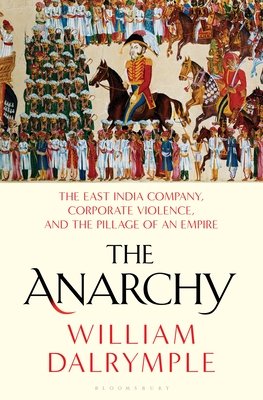The Anarchy by William Dalrymple is a gripping account of the East India Company’s rise to power and its role in reshaping India’s history. The book chronicles how this private corporation exploited resources, manipulated politics, and waged wars to establish dominance. Dalrymple vividly portrays the devastating impact of corporate greed, colonial ambition, and systemic violence on Indian society. By examining the company’s unchecked power, the book offers critical insights into the consequences of intertwining commerce with imperialism. The Anarchy is a meticulously researched and compelling narrative that highlights a pivotal chapter in global history with enduring relevance today.
The Anarchy The East India Company Corporate Violence and the Pillage of an Empire
₨2,199₨2,495
William Dalrymple recounts the rise and fall of the East India Company, a corporation that conquered and exploited India. The Anarchy reveals how unchecked corporate greed and colonial violence reshaped global history, offering a cautionary tale of power and capitalism
Related products
Guns,Germs and Steel
₨999Guns, Germs, and Steel by Jared Diamond investigates the environmental and geographic factors that influenced the development of civilizations. Diamond argues that geography played a crucial role in determining which societies prospered and others were doomed to fail.
₨1,300A Hard Country
₨999Pakistan: A Hard Country by Anatol Lieven offers an in-depth analysis of Pakistan’s political, social, and cultural landscape. Through extensive research and firsthand experience, Lieven explores the challenges and complexities that shape Pakistan’s identity and governance.
₨1,100THE LESSONS OF HISTORY
₨2,030The Lessons of History distills centuries of historical insights into timeless lessons about human nature, politics, and culture. Will and Ariel Durant provide a sweeping analysis of patterns in history, offering thought-provoking perspectives on civilization’s achievements and recurring challenges.
₨2,295Koh i Noor The History of the Worlds Most Infamous Book
₨2,200Koh-i-Noor by William Dalrymple traces the tumultuous history of the Koh-i-Noor diamond, from its origins in India to its controversial acquisition by the British. Dalrymple explores the politics, wars, and intrigue surrounding one of the world’s most famous jewels.
₨2,550Islam: a Short History
₨1,910One of the world s foremost commentators on religious affairs on the history (and destiny) of the world s most misunderstood religion.
₨2,145Seasons of Silence
₨799Seasons of Silence by Mamun Adil is a poignant novel that explores themes of love, loss, and the passage of time. It follows the journey of a man struggling with his emotions, personal battles, and the silence of unspoken words.
₨1,000Nexus: A Brief History of Information Networks from the Stone Age to AI
₨799Harari traces the evolution of information networks from prehistoric communication methods to modern-day digital systems. This book explores how each advancement in human connectivity has shaped societies, economies, and civilizations, culminating in the impact of artificial intelligence on our world.
₨1,199The Invention of Science: A New History of the Scientific Revolution
₨2,590A companion to such acclaimed works as The Age of Wonder, A Clockwork Universe, and Darwin’s Ghosts—a groundbreaking examination of the greatest event in history, the Scientific Revolution, and how it came to change the way we understand ourselves and our world.
₨3,545









